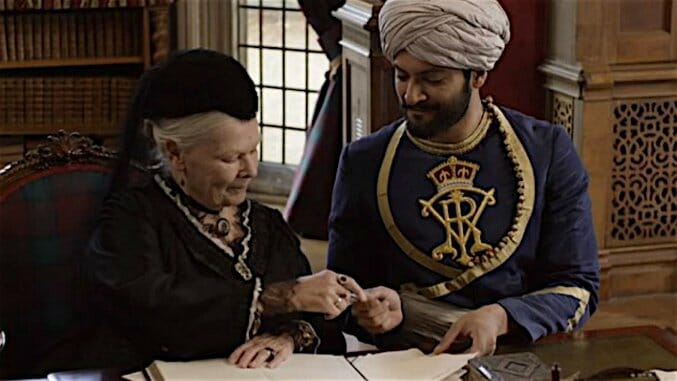Victoria and Abdul

Let me say this at the outset: I love Stephen Frears, and I think anyone who isn’t blown away by Judi Dench might need a psych eval.
And if you think those are fighting words I’m going to take one step farther out onto the ledge before I start complaining about a few glaring missed opportunities in Frears’ Victoria and Abdul. I can’t know what was in Frears’ head or that of screenwriter Lee Hall, but I’m kind of wondering if everyone was so scared shitless of being excoriated no matter what they did with the character of Abdul Karim (Ali Fazal) that they left his character to be a sort of glyph in a misguided attempt to evade censure for perceived clueless, or bigoted, handling of an Indian Muslim character. It strikes me that we might be looking at a political correctness casualty, which ironically looks a lot like its own opposite. Actually I’m not sure that’s irony—it might just be physics.
The film is part fantasia, “based on true events … mostly.” Abdul Karim was a real person and he really did find himself sent to London to present something to Victoria, one of whose titles was Empress of India. She really did take a shine to the guy, and he really did become her confidant and Munshi or teacher, which really did piss off more than a few royals and power-mongering government types. And yes, the Queen actually learned, at a fairly advanced age, to read and write Urdu. There is a great deal of missing information about Karim, in no small part because King Edward incinerated a great deal of paper that would have shed light on the nature of Karim’s actual relationship with the queen.
But in reality, the presence of an Indian person around the British palace would not have been shocking in its day; India was part of the British Empire and there were scads of Indian folks in London just as there were tons of British people in India. Yes, Karim disgruntled a lot of peripheral toadies, but since we don’t see much character development on that front, we’re left to assume it was wall-to-wall racism of which Victoria was a shining curmudgeonly bastion of resistance. Noblesse Oblique? Whatever you want to call it, it obscures the fact that what a lot of folks apparently disliked about Karim was his relentless jockeying for power. In the film, having him knighted, to the horror of the peanut gallery, was the royal whim of Her Majesty. We do know enough about Karim to know it was something he spent years lobbying her for. The passive and saintly portrayal not only does the culturally, um, embarrassing work of erasing the brown guy by making him nothing but a foil for Victoria—it also makes the movie hollow and boring, and I feel sad saying that about Frears. Had they made Karim a little more ambitious and unsavory (which in reality it seems he probably was), they would have made both characters more interesting.